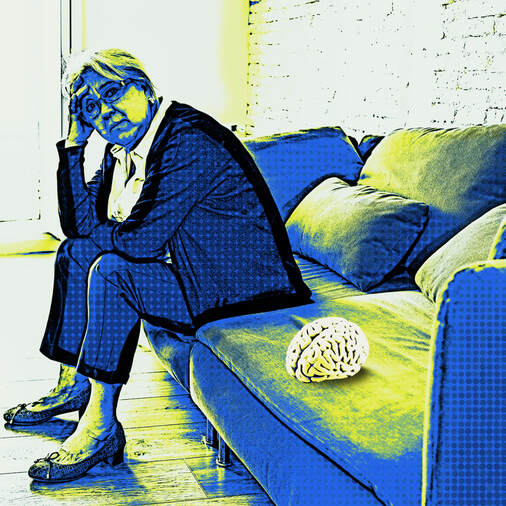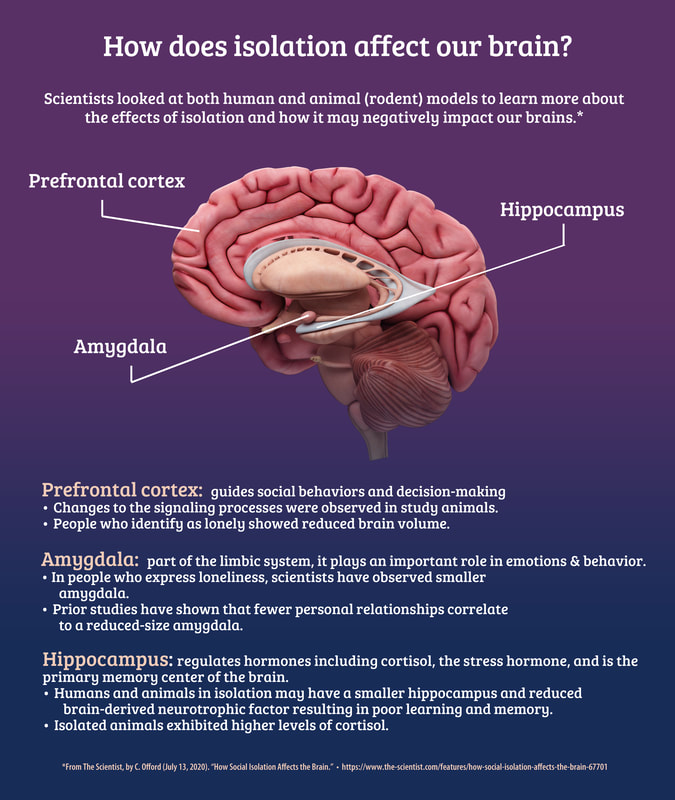The brain in isolation. An article in the July issue of The Scientist magazine addresses in great detail a number of increased efforts worldwide to study the issues of loneliness and isolation, especially now in light of what is a growing concern that compromises our wellbeing on many fronts. Studies have found that chronic social isolation is associated with cognitive decline and that isolation often precedes decline by several years. Long term investigations such as the English Longitudinal Study of Ageing (ELSA) found that “people who reported having fewer social contacts and activities at the beginning of the study (in 2013), showed greater decline in cognitive function, as measured by verbal fluency and memory recall tasks, after four years.” Scientists also identified several areas in the brain associated with loneliness: the prefrontal cortex; the hippocampus; and the amygdala, revealing that each of these areas was smaller or presented with reduced volume in people who were isolated or lonely. As the article also notes, “Studies of animals and people experiencing isolation have identified several brain structures that appear to be affected by a lack of social interaction. Although these studies can’t identify causal relationships—and don’t always agree with one another—they shine a light on some of the mechanisms by which physical isolation, or feelings of loneliness, could impair brain function and cognition.”1 In previous research, the ill effects of loneliness have been likened to the equivalent of smoking 15 cigarettes a day.2 Other associated health detriments range from increased cardiovascular problems, substance abuse, obesity, and related conditions. And specific to our brain, the impacts of isolation may also include:
• Exacerbated or poorly managed stress. • Altered brain function and poor decision-making. • Decreased memory and cognitive function. • Increased stroke risk. • Increased progression of Alzheimer’s disease. • Anxiety, depression, behavioral changes and incidence of suicide. • Substance abuse. We also have written before about the impact to our “brain behind the mask.” The need to use masks that unfortunately impede the process of facial recognition, expression and neuroplasticity is an additional burden that can contribute to a sense of isolation as well. This is all a very complex issue and one that doesn’t have a simple answer – but we know the most vulnerable members of the population, whether elderly, young and alone, or patients who have diagnosed neurological or other chronic illnesses are certainly more at risk now. A brief history of being social. Humans evolved as social creatures and experts have explained why the process of staying apart from one another has been so daunting. An article from The Conversation explains why this all is very unnatural to us: “We have literally evolved to be social creatures, and it’s really no wonder so many of us find social distancing intimidating. It’s not all doom and gloom, however. Humans’ intense sociability has evolved over a very long period of time to make us habitually able to maintain relationships with large numbers of people, and so improve our shared chances of survival." In “A Biography of Loneliness: The History of an Emotion” the British historian Fay Bound Alberti defines loneliness as “a conscious, cognitive feeling of estrangement or social separation from meaningful others,” and she objects to the idea that it’s universal, trans-historical, and the source of all that ails us.* She argues that the condition really didn’t exist before the nineteenth century, at least not in a chronic form. Isolation is not a new problem. We know from long before the advent of this global health crisis that social isolation can affect our general health in numerous ways. The Internet gave us the ability to connect with even more people around the world, but we also lost the motivation to do so as much in person. Those who have embraced technology – and social media - as the primary means of communication, most often younger individuals, are actually more at risk of being lonely as noted in an article in Psychology Today. But changes in family dynamics and relationships, declines in joining organizations or groups, and the ease with which we can seemingly communicate with others without having to actually leave our homes have just contributed to even more people being alone. And now, many of us have become even more isolated than before. It’s important to note that isolation and loneliness do not have to go hand-in-hand. Individuals who are isolated, but are high functioning or independent and able to facilitate typical daily life activities (e.g. still drive, take walks, have access to technology) are less likely to experience loneliness than those who are without resources. There are many older people who until COVID 19 were out and about doing more than others who are half their chronological age…the expression “you’re only as young as you feel” came about for a reason! Likewise, there are just as many younger, single people who are coping with the struggle of being very much alone, limited in their mobility now or working from home and without the face-to-face interaction they would have experienced at their job. How can we better cope with isolation? Fortunately, we do have some recourse to combat both isolation and loneliness. Chat via video or a “facetime” call or just make a phone call to let someone know you’re thinking of them. If you’re alone, reach out to people who may be on their own too, whether a neighbor, family member or a friend. Several great sites have been started during the last few months to help connect people of all ages with one another. We’ve included the links to a few resources at the end of this article, but check out Quarantine Buddies, Generation Tech (“Gen Tech”) or how about signing up for a virtual movie-watching club with Long Distance Movie Nights?! Look for similar efforts in your area, including community groups or organizations that have organized activities either online or allow for physical distancing outdoors – getting out in nature combined with any exercise can be a powerful healer and brain booster! What’s really wonderful about all of these and other ventures is how younger generations are connecting with older individuals in such unique ways and making a difference. Remember that it only takes one person’s actions to change someone else’s world. And kindness is not just good for someone else, it’s good for our brains too - the positive effects of kindness are experienced in the brain of everyone who witnessed the act, improving their mood and making them significantly more likely to reciprocate the gesture and multiply the benefits3! Let us know what programs you’ve discovered or ideas for overcoming isolation or loneliness – we’d love to include them in our list of “helpful links!” And as always, we are here for you so let us know how we can help. In health and hope, Dr. Suzanne Gazda References and reading: 1 Offord, C. “How social isolation affects the brain.” The Scientist. (July 13, 2020) https://www.the-scientist.com/features/how-social-isolation-affects-the-brain-67701. Retrieved 7/27/2020. 2 American Psychological Association: https://www.apa.org/monitor/2019/05/ce-corner-isolation 3 Dartmouth University https://www.dartmouth.edu/wellness/emotional/rakhealthfacts.pdf *A Biography of Loneliness. Alberti, F.B. (2019) https://www.amazon.com/Biography-Loneliness-History-Emotion/dp/0198811349?ots=1&tag=thneyo0f-20&linkCode=w50 News stories and links: Generation Tech website helps connect people looking for a friend: https://gentechco.org/ https://www.cbsnews.com/video/website-helps-connect-people-looking-for-a-friend-during-the-pandemic/ Quarantine Buddies: https://www.qtinebuddy.com/ https://www.cbsnews.com/news/gen-z-volunteers-senior-citizens-lockdown-loneliness-technology/ Quarantine movie club: https://www.cbsnews.com/video/a-quarantine-movie-club-for-seniors-millennials/
0 Comments
Your comment will be posted after it is approved.
Leave a Reply. |
AuthorDr. Suzanne Gazda, Integrative Neurology Archives
February 2024
Categories |


 RSS Feed
RSS Feed